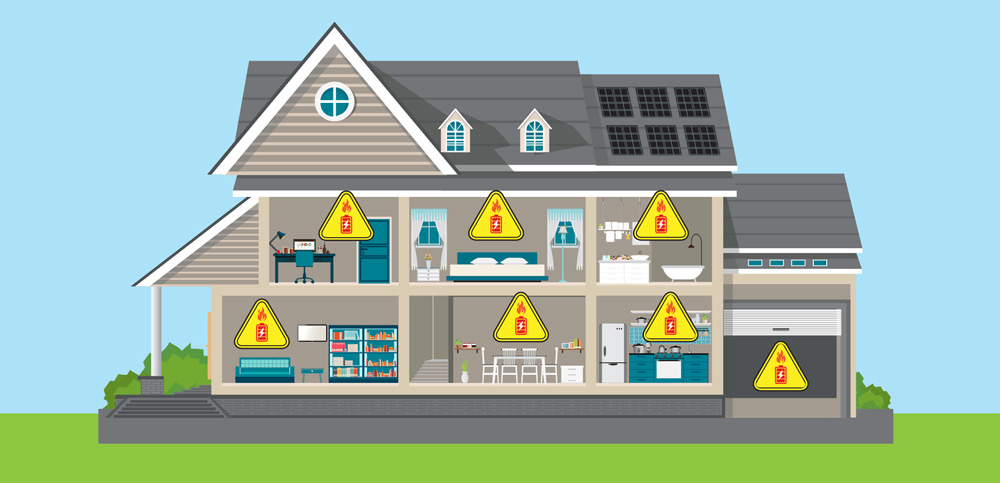
We pledge to provide straight talk from our NNINS Virginia insurance experts. Read the Northern Neck Insurance Integrity Promise.
Lithium-ion batteries are becoming ubiquitous in our everyday lives, powering laptops, smartphones, cameras, vacuum cleaners, electronic cigarettes, and other household gadgets, including lawn equipment and power tools. Dangerous explosive fires from these convenient batteries are simultaneously on the rise. Purchases of larger devices like electric scooters, e-bikes, and hoverboards have jumped since early in the pandemic. These high-tech micromobility devices have lithium-ion batteries 50 times larger than that of a smartphone and can pose a significant danger due to a lack of compliance with the standards through certification from an accredited testing laboratory.
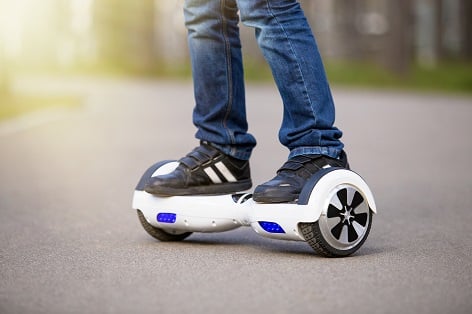
From January 2021 to late November 2022, the Consumer Product Safety Commission received more than 200 reports of fire or overheating from battery-powered micromobility products resulting in 19 fatalities in 39 states. Unfortunately, home fire incidents and injuries will increase until there are improved regulations around the consistent quality of lithium-ion battery-powered devices and the batteries themselves. The good news is homeowners can and should take measures to protect their families and home.
Why do lithium batteries catch fire?
High-quality lithium batteries are made to deliver high output with minimal weight and can be quite safe as long as there are no defects and the batteries are not damaged or mistreated. However, components are designed with thin partitions between cells and a thin outer covering. If lithium-ion batteries are punctured or experience an electrical fault like a short circuit, " thermal runaway " can occur, a chemical reaction that can heat up the battery faster than it can give off that heat. This process often leads to a catastrophic explosion and large and destructive fire.
What causes lithium battery fires?
There are other reasons lithium-ion batteries fail. For one, not all lithium batteries are the same. There is such a demand now for lithium batteries that the supply is dwindling. A flood of third-party devices and replacement batteries for all kinds of products that have not gone through rigorous testing requirements have flooded the market, especially online. There is also off-market charging equipment for sale. Storing batteries and charging devices in a location with higher temperatures or moisture can also cause faster degradation of almost every battery component and can lead to significant safety risks, including fire or explosion.
Lithium-ion batteries can be discharged and recharged many times, almost back to their original charge. They do not function well, however, if they are over-charged or completely drained before recharging. Car chargers are notorious for overcharging batteries.
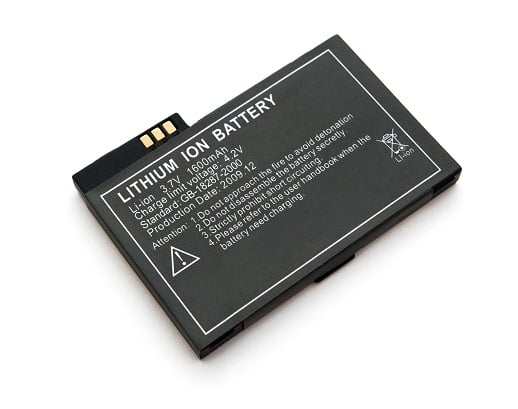
How to prevent lithium battery fires at home
Fires from larger lithium-ion batteries are not a slow and gradual burn. They are explosive and can be very difficult to extinguish. Here's our checklist to prevent a home fire from these common devices:
- Buy devices and replacement batteries only from reputable retailers and avoid 3rd party sellers on online marketplaces.
- Buy UL-certified new and pre-owned devices, electric bikes, and scooters from reputable retailers.
- Don’t charge the batteries unattended, while sleeping, or away from home.
- Prevent over-charging by taking the device off the charger once they have fully charged.
- Always use the manufacturer’s charger that comes with the device and buy the replacements directly from the manufacturer.
- Immediately stop using the device or battery if it is dropped, damaged, or exposed to water.
- Routinely inspect lithium batteries to make sure there is no cracking, bulging, or leaking.
- Store and charge chargers and devices in a fire-resistant container in a cool, dry place.
- If any device is noticeably hot while charging, unplug it immediately and seek service.
- Minimize exposure to low temperatures, especially when charging.
- When charging an electric scooter or bike, do not block a fire escape or exit route.
- Do not store any batteries loosely in a junk drawer with other metal objects.
- Store all batteries in the container they are sold in or standing upright.
- Do not leave batteries or devices in direct sunlight or in hot vehicles.
- Do not charge a device under a pillow, blanket, on a bed or couch, or by any flammable material.
How to extinguish lithium battery fires
If a fire occurs, the sheer volume and explosive nature of these events make them very hard and dangerous to extinguish. Hand-held powder extinguishers do not work, and these fires create extremely toxic gases. Lithium-ion fire extinguishers, a new type of fire extinguisher that is specifically made for use with lithium-ion battery fires, can be found but are very expensive.
Thermal runaway produces its own oxygen, often reigniting fires after being extinguished. Due to the unpredictable and volatile nature of these fires, the best thing to do is to leave the room immediately, close the door, evacuate your home, and call 911. Having smoke detectors and fire extinguishers in your home is a smart way to help protect your family from any home fire.
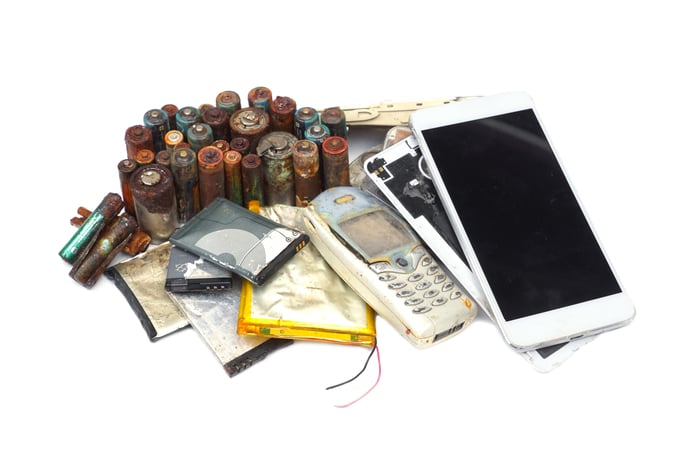
How to safely dispose of batteries in Virginia
There are four types of rechargeable batteries in homes today: lithium-ion, nickel-cadmium (ni-cad), nickel metal hydride, and small sealed lead acid batteries (SSLA's under 2 lbs.) When damaged or exposed, these batteries pose a major fire hazard and can not be thrown away in your trash or placed in your regular recycling bin.
Rechargeable batteries, rechargeable devices, and lithium batteries that no longer function or have been damaged, deemed defective, or recalled should be recycled properly. They should be recycled at a hazardous waste facility or with certified battery electronics recyclers that accept batteries in your local area. Several chain stores that sell electronics or batteries collect batteries for recycling. Any rechargeable electronic device has a rechargeable battery and needs to be recycled when it no longer holds a charge. Examples include laptop computers, remote control toys, portable power tools, video cameras, smartphones, and cordless phones.
Before taking your lithium, rechargeable, or single-use alkaline batteries to be recycled, place electrical tape over the ends. Keep lithium batteries stored separately from each other and other types of batteries in a cool, dry place. Metal coffee cans with kitty litter provide a safe storage option. When transporting them to be recycled, place them in separate sealed small zip-lock plastic bags, and do not leave them in your car unattended.
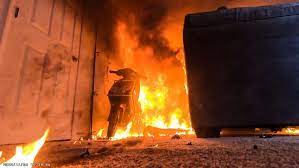
Does home insurance cover damage from lithium-ion battery fires?
Home insurance covers fire damage from lithium-ion batteries. Homeowners insurance typically helps cover damage to the structure of a home as well as attached structures, such as a garage. Standard home insurance coverage usually also extends to your personal belongings, such as furniture and clothing. Always read and discuss your policy with your local agent to learn what risks are excluded from your coverage and that you have the appropriate limits. Assess if it makes sense to have enough coverage to fully replace your home.
Electric vehicles and lithium ion batteries
If you own an electric vehicle (EV), it’s important to understand the different risks that these vehicles pose to your home and property. There are two different ways to charge your vehicle at home, depending on how fast you want to charge your car. Always consult a licensed electrician whose work is properly permitted and inspected by our local codes department. Your electrical system may need to be upgraded. Ensure proper modifications and safety equipment are included. Currently, home insurance rates are not higher when you own an EV, but it's a good idea to inform your local agent if you purchase one.
Safety precautions for EVs at home
Electric vehicles are quite safe when following the recommendations for care and charging. EVs are less likely to catch fire than traditional vehicles. Here are a few safety precautions you can take to ensure safety, especially following a collision:
- Avoid using an extension cord to charge your EV.
- Store all charging equipment, including connection hoses, out of reach of children and pets to prevent the chance of electrocution and tripping hazards.
- Place heat detectors in any enclosed area that you park and charge your vehicle.
- Regularly check your charging station for any changes.
- If your EV is involved in a crash, take it to a repair shop as soon as possible to have the battery inspected for damage. It's best to avoid parking it in a garage until you know the car's lithium-ion battery is safe.
It's smart and easy to keep your home and family safe from the potential fire hazards of lithium-ion batteries if you take the time and precautions. Follow our helpful tips and keep powering your life and the devices you love safely.
Flooding and lithium battery combustion
There is a growing concern that is unique to coastal areas in Virginia and other hurricane zones — the spontaneous combustion of EVs and other battery-powered devices after flooding by the storm surge and flooding. Hurricane Helene resulted in at least 64 lithium battery fires in Florida. EVs accounted for 17 of those but the rest were overheating and sometimes exploding lithium-ion batteries in golf carts, electric bikes and scooters and wheel chairs. Water conducts electricity and can a cause a short-circuit, which creates heat and potentially fire.
The threat of lithium battery fires can worsen damage to homes and buildings after floods and are difficult to extinguish. To prevent water damage to your EV when a storm or hurricane is forecasted, relocate them to higher ground or a protected parking area where flooding is not expected.
What if my EV or other battery-operated device is flooded?
If your electric car floods or device does come in contact with water, take fire safety precautions to avoid injury and property damage:
- Contact your manufacturer and follow recommendations for your specific vehicle/device.
- If the vehicle is being stored indoors, and can be moved, move it outside into an open-air location. If it cannot be moved, try to keep the storage area open and vented.
- Leave all windows and/or doors open to allow any potentially flammable gases to vent from the passenger compartment.
- Unplug and do not attempt to charge the vehicle.
- Disable the vehicle by chocking the wheels, placing the gearshift in park and removing the ignition key and/or disconnecting the 12V battery.
- Avoid contact with the HV battery especially if a vehicle is showing signs of a damaged or overheating HV battery.
Sources:
https://www.arcgis.com/apps/dashboards/7be4875ef3f64d628810c3e5e84eb76f
https://www.nfpa.org/education-and-research/home-fire-safety/lithium-ion-batteries
https://www.nhtsa.gov/sites/nhtsa.gov/files/interimguide_emergencyresponse_012012_v3.pdf
THE NORTHERN NECK INSURANCE INTEGRITY PROMISE — We pledge to provide straight talk and good counsel from our NNINS Virginia insurance experts through our blog. While we hope you find this to be a helpful source of information, it does not replace the guidance of a licensed insurance professional, nor does it modify the terms of your Northern Neck Insurance policy in any way. All insurance products are governed by the terms in the applicable insurance policy.


